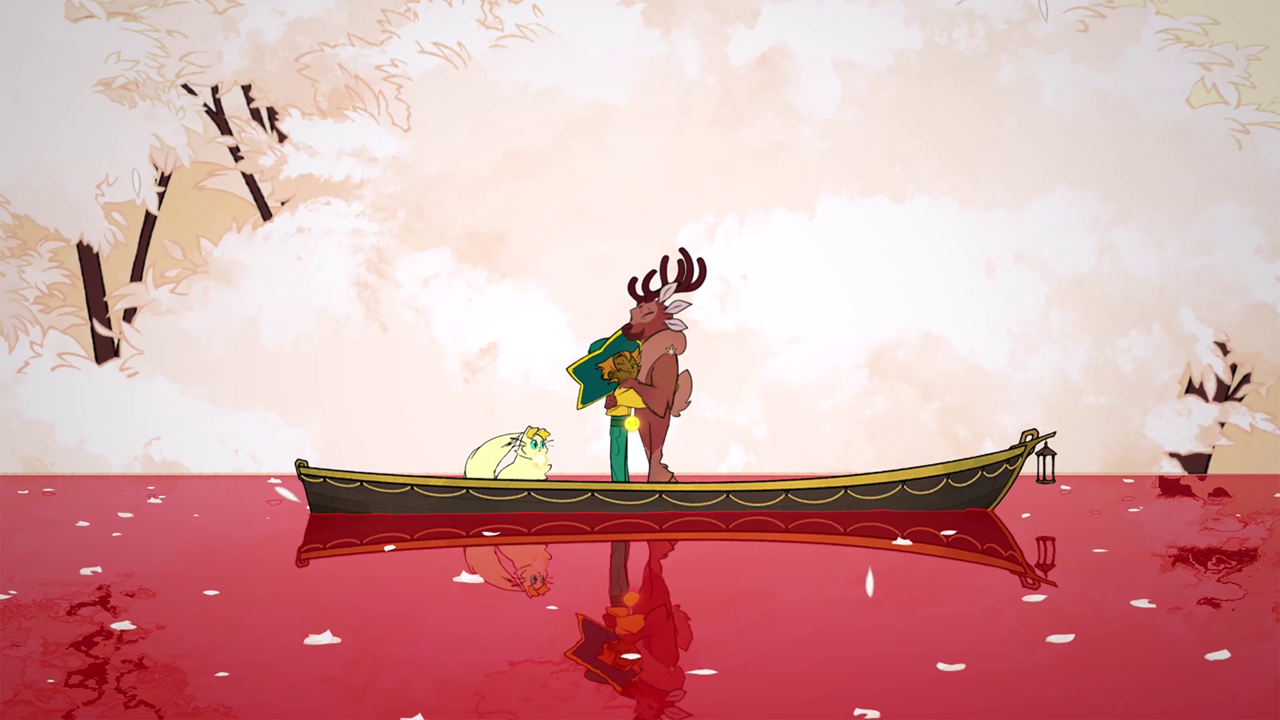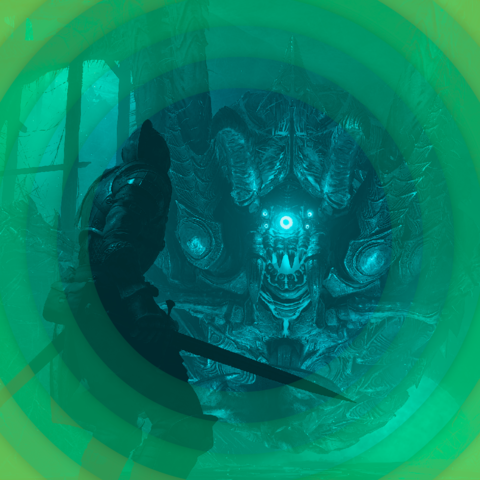Over the next week, we will be posting features for what we've nominated to be the best games of 2020. Then, on December 17, we will crown one of the nominees as GameSpot's Best Game of 2020, so join us as we celebrate these 10 games on the road to the big announcement. Be sure to check out our other end-of-the-year coverage collected in our Best Games of 2020 hub.
Spiritfarer is a cozy resource management and farming sim with a dreamy, colorful art style and adorable talking animals. It's also a game about death, grief, and the process of letting go. Though these two aspects may seem at odds, Spiritfarer finds a delicate balance between its lighthearted adventure gameplay and the heavier themes woven throughout, offering a large, intriguing world to explore and characters you'll come to love along the way.
Spiritfarer has an amusing connection to one of our other Game of the Year nominees, Hades, both of which feature the mythological ferryman Charon, who transports souls to the world of the dead. But while he plays a more minor role of shopkeeper in Hades, Spiritfarer dives deeper into the role of Charon--the Spiritfarer--and what it might entail if someone else stepped into his shoes. In this case, Charon's successor is a young girl named Stella, who, with the help of her fluffy cat Daffodil, must take on the responsibilities of the Spiritfarer and accompany recently deceased souls to the world beyond this one, marked by an ancient bridge called the Everdoor. Charon's role has ended, and even he must pass through the Everdoor--an early reminder that no one can escape death in the end, even the ferryman of souls.
Stella radiates warmth and compassion with every facial expression, movement, and gigantic hug she gives throughout the game, distinguishing her as a much more caring Spiritfarer than her predecessor--it's a safe assumption that Charon (described as "cold" by one character) wasn't baking pies and decorating the homes of his passengers. Stella is the perfect protagonist for Spiritfarer, exuding relentless optimism and empathy for her passengers, who, in turn, open up to her about the stories of their lives, including their greatest memories and deepest regrets.
This close bond extends to you as the player as well--you truly become invested in these souls, who range from an 8-year-old boy who suffered from a fatal disease to an elderly woman with dementia. Presented as animals rather than in human form, these passengers are the shining light of Spiritfarer, and it's so satisfying to make them happy, whether it's making their favorite meal, finding decorations for their home, or playing a minigame with them. One of the most charming aspects of Spiritfarer is its hugs--every character has their own unique reaction to Stella giving them a hug, and each time, it'll absolutely melt your heart.

As the Spiritfarer, Stella has no shortage of tasks to attend to on her ever-expanding boat, from adding new buildings and homes to growing crops and cooking meals, and it doesn't take long to fall comfortably into the rhythm of Stella's day-to-day routine. You're able to customize your boat, moving different buildings around and stacking them to eventually form a towering community. You can also add structures like ziplines that allow you to more easily move around the boat with Stella's expanding arsenal of platforming abilities. This customization allows you to personalize your boat and make it feel like your own. It also allows you to emphasize whatever aspects you enjoy the most by keeping them close and quickly accessible--for me, those were my kitchens and gardens--while moving some structures further away that you find yourself using less.
For a game about death, Spiritfarer is filled with joy, whether you are gliding across an island, whipping up one of your passenger's favorite meals, or fishing off the side of your boat at night under the gentle glow of the moon.
As much as there is to do on your boat, there's even more to discover in the world beyond it in Spiritfarer. One of the most surprising aspects of the game is just how large this world is, with dozens of different islands and cities to explore. While Spiritfarer may seem like a shorter game, it's actually quite long--I spent over 40 hours exploring the seas and completing side quests, and it never gets old. From major cities to small factory towns and rural forests, you never know what you'll find when you discover new land in Spiritfarer, and it's a blast to explore each one, gathering resources, talking with locals, and sometimes meeting a new person to join you on your boat. You also unlock new abilities throughout the game to enable you to push exploration further, reaching the highest areas and finding the most valuable resources. All of this makes Spiritfarer's world thrilling to explore, motivating you to discover all of its secrets and hidden areas.
Despite all the fun of exploring new areas, expanding your boat, and meeting charming new passengers, you can't escape Stella's real responsibility as Spiritfarer. At some point, every passenger will realize it's their time to pass over, and together you'll climb into Stella's rowboat and make your way to the blood red waters of the Everdoor. It's these quiet moments as you row along, carrying someone whom you've grown to love and care for, that are the most impactful in Spiritfarer. In these final moments, the passenger begins to muse about life, death, and what they've learned--whether they can forgive a past wrongdoing, how they'll be remembered by loved ones, the nature of humanity. These quiet monologues are beautifully written and culminate in one final hug as the soul passes through the Everdoor. It's hard to express how impactful these moments are, letting each character move on after you've cared for them and listened to their stories. More than once, I broke down crying after an Everdoor scene--the level of emotion they evoked often surprised me.

And then, it continues. With each goodbye, the story moves on, just as Stella must move on, and you carry a little bit of each companion who has passed with you in the form of lessons they've taught (as well as their physical homes, which remain behind). There are always more crops to be farmed, more items to be crafted, and more islands to explore, but as with life itself, it's the people you meet that define this journey over the everyday tasks you perform. Spiritfarer teaches a powerful lesson about cherishing your relationships and the memories you shared together over regretting that someone has moved on.
Ultimately, you could keep farming and traveling around in Spiritfarer forever, but eventually, you're given the option to end your game and complete Stella's final journey. This prompt hits you sharp in the chest--you know it's coming from the beginning, but you think, I thought I had more time, more things to accomplish. The game gives you as much time as you need to wrap up any loose ends and make your choice to go to the Everdoor, but eventually, as I looked around at my fully expanded boat and my single remaining passenger, who lingered behind to keep me company, I realized I was ready to move on. Sure, I hadn't 100% cleared the game and collected every item and recipe, but I reached a point where I was satisfied and at peace with everything I'd done. I could accept Stella's fate. I took her where she needed to be. I sobbed for a full 15 minutes afterward, and since, I haven't been able to stop thinking about this game.
Spiritfarer feels like an essential game for anyone who has ever experienced a painful loss or who has stayed up at night worrying about death. It's also a fitting game for 2020, a year wrought by so much pain and isolation. For a game about death, Spiritfarer is filled with joy, whether you are gliding across an island, whipping up one of your passenger's favorite meals, or fishing off the side of your boat at night under the gentle glow of the moon. Its world feels like home; its characters become not only passengers, but beloved friends and family. And just as much as you help each character fulfill their needs, they help you in return, giving you the strength to keep living and accept your time when it comes. Spiritfarer is a truly special game from beginning to end, and its message of compassion, acceptance, and courage is one we could all benefit from hearing, now more than ever.
Spiritfarer is available digitally on the Nintendo Eshop, Steam, PlayStation Store, and Xbox Store.




